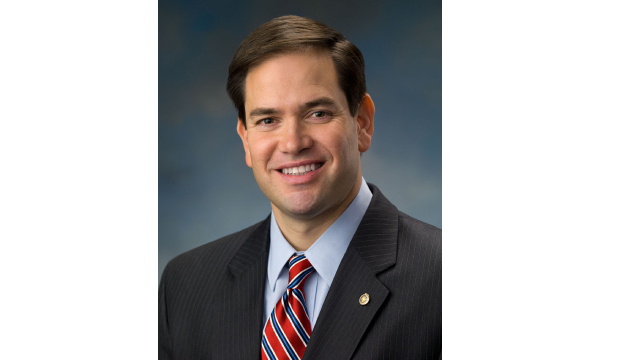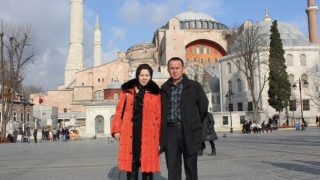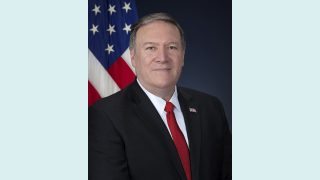
Beijing announced sanctions Monday on U.S. officials and a government agency in retaliation for ones leveled last week by the Trump administration against Chinese officials deemed responsible for abuses in northwest China’s Xinjiang Uyghur Autonomous Region (XUAR).
China’s Foreign Ministry said the sanctions target republican senators Ted Cruz of Texas and Marco Rubio of Florida, republican representative Chris Smith of New Jersey, Ambassador-at-Large for International Religious Freedom Sam Brownback, and the bipartisan Congressional-Executive Commission on China advisory panel.
Foreign Ministry spokeswoman Hua Chunying told reporters at a regular news briefing in Beijing that the move was in response to Washington’s “wrong moves” over the situation in Xinjiang, including the unprecedented step of bringing sanctions against a member of the powerful Politburo of the Chinese Communist Party (CCP).
“We urge the U.S. to immediately revoke the wrong decision and stop any words and deeds that interfere in China’s internal affairs and harm China’s interests,” Hua said.
While she did not provide details on what restrictions the sanctions involved, Hua warned that China “will make a further response depending on the development of the situation.”
Rubio is the co-chair of the CECC, while Smith is its vice ranking member. They, along with Cruz and Brownback, have made repeated statements critical of China’s policies in the XUAR, where authorities are believed to have held up to 1.8 million people in a vast network of internment camps since April 2017.
Beijing describes the three-year-old network of camps as voluntary “vocational centers,” but reporting by RFA’s Uyghur Service and other media outlets shows that detainees are mostly held against their will in cramped and unsanitary conditions, where they are forced to endure inhumane treatment and political indoctrination.
In a statement on Monday, Cruz said the sanctions suggest that the CCP “is terrified and lashing out.”
“They forced over one million Uighurs into concentration camps and engaged in ethnic cleansing, including horrific forced abortions and sterilizations,” he said, referring to a recent report by German researcher Adrian Zenz which concluded that an uptick in “family planning” measures in the XUAR amounts to genocide, according to United Nations definitions.
Cruz said China has been perpetrating “egregious human rights atrocities that cannot be tolerated” in the XUAR and must be held accountable.
He dismissed China’s move as largely symbolic, noting that “I don’t have plans to travel to the authoritarian regime that covered up the coronavirus pandemic and endangered millions of lives worldwide.”
In an interview with RFA’s Tibetan Service, Smith called the sanctions against him “not unexpected,” saying he expects more to come, including against other U.S. officials who have spoken out against China.
“I was hoping to travel there—I’m still hoping to travel to Xinjiang and to Hong Kong—so a visa ban does have an impact on what I had hoped to do,” he said.
“That said, it is the people themselves that we are standing in solidarity with—with the oppressed and against the oppressor.”
The CECC in a statement Monday suggested that China should stop “blaming others” and end its abuses in the XUAR.
“This is another attempt by Beijing to try to intimidate and silence voices around the world who are critical of its human rights policies and violations of universal standards and norms,” the commission said.
“The CECC will not be silenced and will continue to press the U.S. and the international community to stand together and shine a bright light on Beijing’s human rights abuses and the officials who carry them out.”
A spokesperson for the U.S. Department of State said China’s announcement of retaliatory sanctions “further demonstrates the CCP’s refusal to take responsibility for its actions.”
“These threats will not deter us from taking concrete action to hold CCP officials accountable for their ongoing campaign of human rights abuses against members of ethnic and religious minorities in Xinjiang, including mass detentions, coercive forced abortions and forced sterilizations, and restrictions on religious and cultural identities,” the spokesperson said in a statement.
“There is no moral equivalency between these PRC (People’s Republic of China) sanctions and actions taken by countries holding accountable CCP officials for their human rights abuses.”
US sanctions to ‘continue’
China’s sanctions follow a July 9 announcement by Secretary of State Mike Pompeo that he had barred Chen Quanguo, the Party Secretary of the XUAR; Zhu Hailun, Party Secretary of the Xinjiang Political and Legal Committee (XPLC); and Wang Mingshan, the current Party Secretary of the Xinjiang Public Security Bureau (XPSB), as well as their family members, from entry into the U.S. “for their involvement in gross violations of human rights” in the region.
On the same day, the Department of Treasury said it is blocking the assets of the XPSB, as well as Chen, Zhu, Wang, and Huo Liujun—a former security official in the region—for their roles in serious human rights abuse under the Global Magnitsky Human Rights Accountability Act. Chen, 64, is the first member of the CCP’s elite 25-member Politburo to be targeted by U.S. sanctions.
“The United States will not stand idly by as the CCP carries out human rights abuses targeting Uyghurs, ethnic Kazakhs, and members of other minority groups in Xinjiang, to include forced labor, arbitrary mass detention, and forced population control, and attempts to erase their culture and Muslim faith,” Pompeo said at the time.
China’s sanctions also came a day after the Washington Post published an editorial by National Security Adviser Robert C. O’Brien in which he warned Beijing that the administration of U.S. President Donald Trump will continue to punish Beijing for its actions in the XUAR.
O’Brien noted that, in addition to last week’s sanctions, the administration earlier this month announced a business advisory for U.S. companies with supply-chain exposure to entities engaged in the CCP’s use of forced labor and other human rights abuses in Xinjiang.
The White House has also imposed export restrictions against dozens of Chinese government entities and companies complicit in those abuses, he said, while moving to block the illegal import of goods produced by firms known to use Uyghur forced labor.
“As long as these human rights violations continue, the Trump administration will respond,” O’Brien wrote.
“If the past century has shown us anything, it is that dangerous ideologies backed by powerful states rarely confine their malign conduct within their own borders. The United States will thus continue to shine the light of truth on Xinjiang—for the Uighurs and for us all.”
Rising tensions
The tit-for-tat sanctions come amid tense relations between the U.S. and China, with the Trump administration taking multiple jabs at Beijing in recent months for its lack of transparency in handling the coronavirus pandemic, trade policy, and expansive territorial claims.
The president has also said he would take steps to remove special trade status for Hong Kong and sanction both Mainland and Hong Kong officials, citing Beijing’s encroachment on the territory’s autonomy, including through its recent imposition of a draconian security law on the city.
Over the weekend, the U.S. Department of State issued a security alert to U.S. citizens in China, saying they face a heightened risk of arbitrary detention due to the “enforcement of local laws for purposes other than maintaining law and order,” in an apparent reference to the National Security Law for Hong Kong.
Article 22 of China’s National Security Law for Hong Kong bans anyone from “seriously interfering in, disrupting or undermining the performance of duties and functions in accordance with the law by the body of central power of the People’s Republic of China or the body of power of the Hong Kong Special Administrative Region by force or threat of force or other unlawful means.”
In its alert, the State Department warned that U.S. citizens could be detained in China without access to consular services or information about their alleged crime, subjected to lengthy interrogations or detention for reasons related to “state security,” and face arrest for sending private electronic messages critical of the Chinese government.
Source: Copyright © 1998-2016, RFA. Used with the permission of Radio Free Asia, 2025 M St. NW, Suite 300, Washington DC 20036. https://www.rfa.org.


